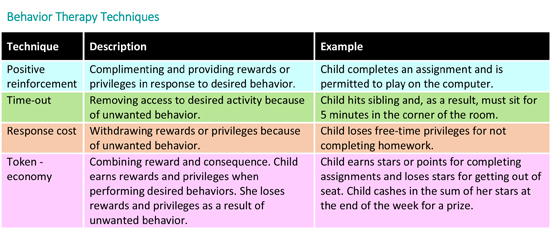Most experts recommend using both medication and behavior therapy to treat ADHD. This is known as a multimodal treatment approach.
There are many forms of behavior therapy, but all have a common goal—to change the child’s physical and social environments to help the child improve his behavior.
Under this approach, parents, teachers, and other caregivers learn better ways to work with and relate to the child with ADHD. You will learn how to set and enforce rules, help your child understand what he needs to do, use discipline effectively, and encourage good behavior. Your child will learn better ways to control his behavior as a result. You will learn how to be more consistent.

The table below shows specific behavior therapy techniques that can be effective with children with ADHD.
Behavior therapy recognizes the limits that having ADHD puts on a child. It focuses on how the important people and places in the child’s life can adapt to encourage good behavior and discourage unwanted behavior. It is different from play therapy or other therapies that focus mainly on the child and his emotions.
How can I help my child control her behavior?
As the child’s primary caregivers, parents play a major role in behavior therapy. Parent training is available to help you learn more about ADHD and specific, positive ways to respond to ADHD-type behaviors. This will help your child improve. In many cases parenting classes with other parents will be sufficient, but with more challenging children, individual work with a counselor/coach may be needed.
Taking care of yourself also will help your child. Being the parent of a child with ADHD can be tiring and trying. It can test the limits of even the best parents. Parent training and support groups made up of other families who are dealing with ADHD can be a great source of help. Learn stress-management techniques to help you respond calmly to your child. Seek counseling if you feel overwhelmed or hopeless.
Ask your pediatrician to help you find parent training, counseling, and support groups in your community. Additional resources are listed at the end of this article.
Tips for helping your child control his behavior:
- Keep your child on a daily schedule. Try to keep the time that your child wakes up, eats, bathes, leaves for school, and goes to sleep the same each day.
- Cut down on distractions. Loud music, computer games, and TV can be overstimulating to your child. Make it a rule to keep the TV or music off during mealtime and while your child is doing homework. Don’t place a TV in your child’s bedroom. Whenever possible, avoid taking your child to places that may be too stimulating, such as busy shopping malls.
- Organize your house. If your child has specific and logical places to keep his schoolwork, toys, and clothes, he is less likely to lose them. Save a spot near the front door for his school backpack so he can grab it on the way out the door.
- Reward positive behavior. Offer kind words, hugs, or small prizes for reaching goals in a timely manner or good behavior. Praise and reward your child’s efforts to pay attention.
- Set small, reachable goals. Aim for slow progress rather than instant results. Be sure that your child understands that he can take small steps toward learning to control himself.
- Help your child stay “on task.” Use charts and checklists to track progress with homework or chores. Keep instructions brief. Offer frequent, friendly reminders.
- Limit choices. Help your child learn to make good decisions by giving him only 2 or 3 options at a time.
- Find activities at which your child can succeed. All children need to experience success to feel good about themselves.
- Use calm discipline. Use consequences such as time-out, removing the child from the situation, or distraction. Sometimes it is best to simply ignore the behavior. Physical punishment, such as spanking or slapping, is not helpful. Discuss your child’s behavior with him when both of you are calm.
- Develop a good communication system with your child’s teacher so that you can coordinate your efforts and monitor your child’s progress.
Article and image courtesy of HealthyChildren.org

